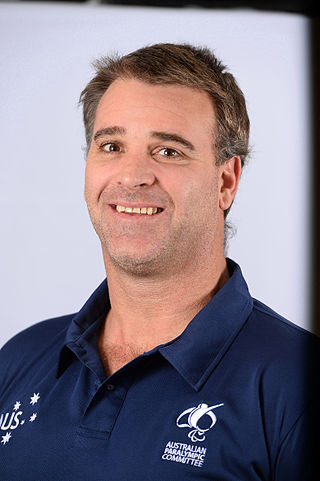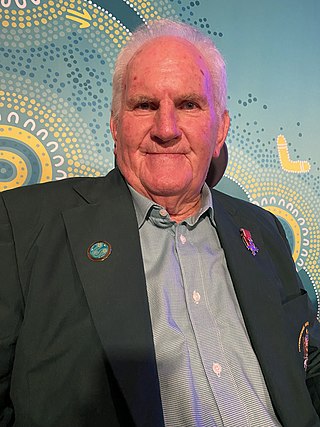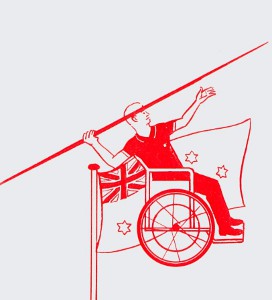
Bradley John Ness, OAM is an Australian wheelchair basketballer. He won a gold medal at the 2008 Beijing and silver medals at 2004 Athens and 2012 London Paralympics. He was selected as the Australian flag bearer at the Opening Ceremony at the 2016 Rio Paralympics. In December 2023, Ness was appointed the Head Coach of the Rollers - Australia men's national wheelchair basketball team.

Australia has participated officially in every Paralympic Games since its inauguration in 1960 with the exception of the 1976 Winter Paralympics.
Francis Ettore Ponta was an Australian Paralympic competitor and coach. He competed in several sports including basketball, pentathlon, swimming and fencing. A paraplegic, he lost the use of both his legs after a tumour was removed from his spinal column when he was a teenager. Ponta was a member of Australia's first national wheelchair basketball team, and is credited with expanding the sport of wheelchair basketball in Western Australia. At the end of his competitive career, he became a coach, working with athletes such as Louise Sauvage, Priya Cooper, Madison de Rozario, Bruce Wallrodt and Bryan Stitfall. He died on 1 June 2011 at the age of 75 after a long illness.

Australia competed at the 1968 Summer Paralympics in Tel Aviv, Israel. The Games significantly expanded in 1968 when compared to previous years, as did the Australian team and the events included in the Games. Mexico City were originally to host the 1968 Paralympics, however, they were moved to Tel Aviv in Israel.

Israel was the host nation of the 1968 Summer Paralympics in Tel Aviv. The Israeli team finished third in the medal table and won sixty-two medals: eighteen gold, twenty-one silver and twenty-three bronze. Over 750 athletes from 28 nations took part in the Games; the Israeli team included 53 athletes, 37 men and 15 women.

Bruno Moretti was an Australian Paralympic competitor.

Daphne Jean Hilton was an Australian Paralympic competitor. She was the first Australian woman to compete at the Paralympic Games. She won fourteen medals in three Paralympics in archery, athletics, fencing, swimming, and table tennis from 1960 to 1968.

Elizabeth Mary Edmondson PLY is an Australian Paralympic competitor and current Australian Masters competitor in swimming. She became a paraplegic after contracting polio as a small child. She won several medals in the 1964 and 1968 Summer Paralympics. She subsequently retired from swimming, only taking up the sport again in 2006 to compete in the 2008 FINA World Masters Championships in Perth.

Gary Leslie Hooper, MBE is an Australian Paralympic competitor. He won seven medals at three Paralympics from 1960 to 1968.
Lorraine McCoulough-Fry was an Australian Paralympic swimmer, athlete and table tennis player.

Michael Mathew Hartnett, OAM is an Australian wheelchair basketball player who won a gold medal at the 2008 Summer Paralympics and the 2010 and 2014 Wheelchair Basketball World Championship.

Shaun Daryl Norris, OAM is an Australian wheelchair basketball player. He was a member of the Rollers at the 2024 Paris Paralympics, his sixth Games.

Also known as the 13th Stoke Mandeville Games, the 1964 Summer Paralympics was the 2nd Paralympic Games. Hosted in Tokyo, the games ran from 8 to 12 November. Australia won a total of 30 medals and finished fourth on the medal tally behind Italy (3rd), Great Britain (2nd) and the United States (1st). Australia competed in 6 of the 9 sports at the Games, winning medals in each of those sports, but was most successful in the pool, winning a majority of their medals in swimming events.

John Martin is an Australian Paralympic archer, athlete, table tennis player, wheelchair basketballer and wheelchair fencer who won three silver medals at five Paralympics. He was born in England and emigrated to Australia with his family at the age of 13.

The Commonwealth Paraplegic Games were an international, multi-sport event involving athletes with a disability from the Commonwealth countries. The event was sometimes referred to as the Paraplegic Empire Games and British Commonwealth Paraplegic Games. Athletes were generally those with spinal injuries or polio. The Games were an important milestone in the Paralympic sports movement as they began the decline of the Stoke Mandeville Games' dominating influence. The event was first held in 1962 and disestablished in 1974. The Games were held in the country hosting the Commonwealth Games for able-bodied athletes, a tradition eventually fully adopted by the larger Olympic and Paralympic movements.

The First Commonwealth Paraplegic Games were held in Perth, Western Australia, from 10 to 17 November 1962. These Games preceded the 1962 British Empire and Commonwealth Games which were held in Perth from 22 November to 1 December of that year. The Commonwealth Paraplegic Games were conceived by George Bedbrook after Perth won the right to host the Commonwealth Games. Great support was received from Royal Perth Hospital, a leading spinal rehabilitation centre in Australia.
Bruce Oliver Thwaite was an Australian Paralympic competitor. During World War II, he sustained a spinal injury when he landed on a tree after parachuting from a bomber plane over Germany. He was treated at the Stoke Mandeville Hospital.
Kevin Cunningham was an Australian Paralympic athlete. A member of Australia's first Paralympic Games team, he participated at the 1960 Rome and 1968 Tel Aviv Paralympic Games.

The second Commonwealth Paraplegic Games were held in Kingston, Jamaica from 14 to 20 August 1966. There were 133 athletes from 10 countries. The Games were opened by Prince Philip.
Victor Salvemini was an Australian Paralympic athlete from Western Australia. As a wheelchair athlete, he competed in several sports including archery, basketball and track sprinting in the 1970s. A paraplegic, he lost the use of both his legs after a car accident in Fremantle, Western Australia in 1961 when he was 14 years old.














